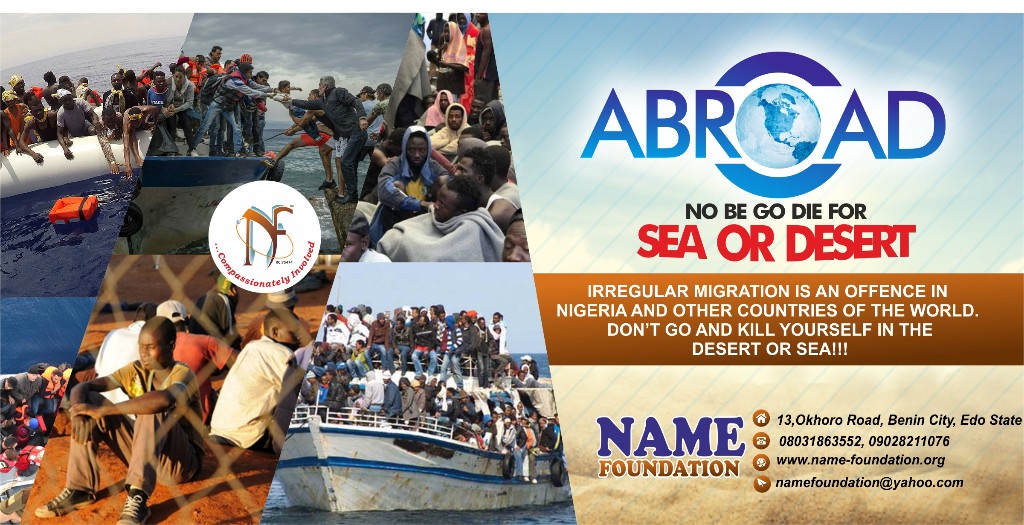Background
Nosakhare is the founder and Executive Director of NAME Foundation, an organisation geared towards tackling human trafficking, child abuse, drug abuse and prostitution. The organisation is based in Edo State, Nigeria. He is an indigene of the State.
He has served as a pastor for several decades. A media professional, he is also a radio/TV host and media consultant.
Insights
AGN: Why did you decide to embark on your intervention through NAME Foundation and when did you decide to do so?
NE: I had heard so many disturbing things about people from my State and their involvement in prostitution abroad that I decided to go to Europe to research the issue with the aim of writing some books about it. I moved to Europe in 2002 in order to do so.
A higher power had other plans for me and in 2003 I took up residency in Turin, Italy and was there till 2010 working as a minister of faith. It was during this time that my involvement in addressing human trafficking began.
On returning to Nigeria I started NAME Foundation informally in 2011, subsequently launching it officially in 2014.

AGN: One can never trivialise the horror of human trafficking irrespective of the scale. It appears this crime has mushroomed, do you have any indication as to when more people began to be ensnared in this horror
NE: In so far as the people from Edo State are concerned, I believe the precursor to this problem began in the 1980’s. Business women were going to Italy to legitimately buy goods for resale in Nigeria, as a result of human interaction and the vagaries of life, some became involved in prostitution.
During the mid 1980’s women were inviting their brothers to come and work in Italy as agricultural hands and so on, it was towards the latter part of the 80’s and early 90’s that the current iteration of this situation began.
Many Africans in Italy were undocumented/using false documents. Typically they were paid around half of what locals would be paid, however, when my compatriots converted their money back to naira it amounted to an appealing amount.
In the early days the Nigerians that arranged things were called trolleys. The passport system made it easy for people to falsify documents so that multiple people could use the same documentation to enter Italy. Things ballooned in the late 90’s up to recent times.
AGN: What would you say are the key factors that lead to people seeking irregular migration as a means to an end?
NE: Poverty of mindset is the number one factor on an individual level where victims are concerned and this is further compounded due to the poverty of mindset inherent in personnel within parts of the institutions of government.
AGN: Do you feel you have adequate data to enable you fine tune your operations?
NE: No. Funding constraints do not allow for comprehensive research/collation of data.
AGN: The nature of this crime means data is not easy to come by, how do you feel about the level of locally derived data on this issue and what more would you like to see done in this area?
NE: Locally sourced data is difficult to obtain from those who have it because many with such information assume you are going to make money from it and therefore expect something in return. However, if funding can be secured obtaining comprehensive data directly is achievable.

AGN: The organ of the Nigerian Federal Government tasked with combating human trafficking and exploitation, the ‘National Agency for The Prohibition of Trafficking in Persons’ (NAPTIP) reported 25 persons were convicted in its annual report for 2019. This represents a reduction from the previous reporting period when 50 persons were convicted in 2018. What do you feel this reduction is down to and are there lessons other countries in Africa can learn from this?
NE: The reduction may be as a result of a number of things such as; traffickers employing new evasive tactics, or a different approach being adopted by officials or the ability of traffickers to circumvent due process after being apprehended. It could also be possible there is a reduction of trafficking taking place. There remains a degree of opacity around the issue.
AGN: In March last year UNHCR’s Senior Liaison Officer, Amah Assiama-Hillgartner is on record stating 70% of Nigerian irregular migrants are from Edo state, if this is something you concur with, despite all of the work various agencies/organisations have been doing to tackle the problem in your state, why is the number still so high?
NE: In my opinion the number is still high because many of the reported training, rehabilitation and reintegration processes going on are riddled with fraud. The same people are being trained and retrained by different organizations/agencies and there is no comprehensive central database that can be accessed in or order to ascertain who has been trained or not. Also, we have found returnees forming alliances to cash in on opportunities.
AGN: There are a number of organisations who are active in supporting, training and economically empowering survivors of human trafficking. The figures look great when you see the number of interventions carried out by these organisations.
It is obvious that just because a person receives training and resources to start up a business, some may not be successful. Failure could be down to any number of reasons or even just due to the fact that running a business is not everyone’s forte.
To what extent is data available on the medium to long term outcomes of such interventions on a person by person basis and do you feel such data is important to have?
NE: The type of data recorded tends to be of the number of people who have received support or training undertaken by various organizations. In some instances it is apparent that what was supposed to be disbursed to the recipient was halved. Some returnees participate in training in order to obtain equipment they can liquidate or for finance they can appropriate in order to retry getting to Europe.
AGN: While there are governments that are doing their bit, civil society/non-state actors are also very dynamic in addressing this issue; through skills acquisition/training, education, entrepreneurship and so on, having said that there are only so many skilled/semi-skilled workers and graduates an economy can absorb. A global economy that does not operate on a level playing field is not going to right itself because of the hardships faced by Africans or black people across the globe in general. As long as even a menial job in parts of the world outside Africa derives greater economic value for most Africans, leaving the continent for such places is unlikely to lose its appeal.
Unemployment and underemployment are very high in Africa across the socio economic spectrum. Do you feel the approach of training and assisting individuals to set up small businesses will yield a long term strategic benefit that will make a pivotal difference?
NE: No! Having been an operator in this field for a long time, it is clear the exchange rate of the Naira to the Dollar, Euro or Pounds Sterling is too attractive for many to overlook.
There are insufficient jobs, poor infrastructural facilities, irregular electrical power, etc in short a myriad of challenging factors that act as a barrier to a vast amount of people making something of their lives here. Obviously this is why so many continue to seek out ways to make the treacherous journey overseas via irregular migration.

AGN: Do you feel rehabilitation of offenders is deemed to be important in Nigeria and to what extent are provisions made to re-orient convicted people so that when they are released from prison they are less likely to re-offend?
NE: The rehabilitation of convicted people is not a bad thing. However, the process shouldn’t lead to them having an enhanced status and unfair privileges after release. I’m in favour of more strategic programmes being put in place to deter people from committing crime in the first place.
AGN: Obviously there are a range of factors associated with a given individuals circumstance, in terms of your experience, where an individual has not sought irregular migration voluntarily, are agents typically known to the victims e.g. relatives or strangers?
NE: The closer the person, the easier it is to convince the victim that he/she can get them to Europe. It is difficult to trust a person you do not know; so those that are related or known tend to be the middlemen/women.
AGN: We hear of instances where people who are returnees and have been trained and possibly assisted to set-up a venture, still seek to drop everything in order to utilize irregular migration to leave Africa, have you come across such instances, if so why does this happen?
NE: Like I said earlier, many talk about the exchange rate of the naira to other major currencies. Some also say life abroad, from what they see on social media is better and sweeter compared to life in their home country; while many just love the idea of living abroad as it is perceived to being successful and accomplished.
AGN: Is there a particular situation that stands out in terms of the terrible experiences you have come across?
NE: Not in particular. I have witnessed several instances of returnees coming home with children without fathers. Some return with HIV/AIDS, amputated limbs, scars or marks of torture. I have seen some truly harrowing things.
AGN: There are organisations and activists addressing human trafficking and exploitation who immediately cease all communication if they don’t feel they will derive any financial benefit. Do you feel it is desirable for non-state actors to collaborate irrespective of financial reward and do you feel it happens to a satisfactory level; if not why do you feel that is?
NE: Many organizations close up once there is no funding. Though not a business enterprise, obviously NGOs and not for profit organizations rely heavily on donations, grants and financial support from stakeholders. To some extent each entity is on its own. A lack of government support doesn’t encourage a collaborative environment.
AGN: What could be done to improve things in terms of collaboration between organisations and how might it benefit the cause in general?
NE: One major improvement needed is in capacity building of organizations, as some have high capacity while others don’t. A framework for collaboration that spelt out roles and processes would be helpful in facilitating linkages so that organisations could learn from each other. Donations and grants specifically for such purposes would enhance collaborative efforts and widen their appeal.
AGN: Is there anything else you would like to add?
NE: I feel the government needs play a greater role in addressing trafficking trends by putting more money into the fight, if not, more and more Nigerians will seek to utilize irregular migration as a means to leave the country.

